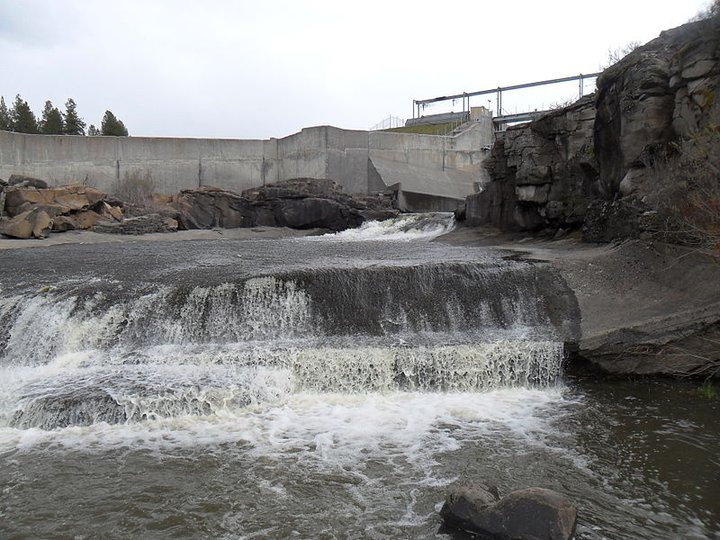Jessica Cejnar / Tuesday, Dec. 24, 2019 @ 4:06 p.m.
Water Resources Board Reissues Klamath Dam Removal Environmental Document, Seeks Public Comment

JC Boyle Dam, one of four along with Copco 1, Copco 2 and Iron Gate, slated for removal from the Klamath River. Wikimedia Commons
The state water resources control board is seeking public comment again on an environmental report focusing on Klamath River dam removal.
The request comes roughly two years before the nonprofit organization tasked with performing the project expects to begin draining the reservoirs behind the dams. However, a Klamath River Renewal Corporation representative told the Outpost on Tuesday that the California Water Resources Control Board second public comment period will not affect the project’s schedule.
“We’re at full speed for 2022 draw down,” KRRC spokesman Matt Cox told the Outpost. “The DEIR is this huge vast document and just two parts of it are being recirculated. The bulk of it is good to go.”
The California Water Control Board received more than 2,500 public comments last year on KRRC’s draft environmental impact report on its petition to obtain a Clean Water Act section 401 certification.
On Saturday, the agency reissued parts of KRRC’s environmental impact report focusing on air emissions modeling and greenhouse gas and energy modeling for the Lower Klamath Project.
Public comment will be accepted through 5 p.m. Feb. 6, 2020, according to the California Water Boards website.
KRRC, the nonprofit tasked with removing the J.C. Boyle, Copco No. 1, Copco No. 2 and Iron Gate dams, is currently petitioning the Federal Energy Regulation Commission for a license to take ownership of the dams over from their current owner, PacifiCorp. The nonprofit will then seek to surrender the license to FERC, which will allow dam removal to move forward.
KRRC hired Fairfield-based contractor Kiewit Infrastructure West Co. last summer to spearhead the project’s construction.
Removing the dams will cost an estimated $434 million. KRRC has a project budget of $450 million with $250 million coming from California water bond dollars and $200 million coming from a PacifiCorp surcharge to its customers.
According to Cox, obtaining the 401 Water Quality Permit from the is part of the project’s overall permitting process needed to obtain the license to transfer and then surrender the project from FERC.
The draft EIR analyzes the project’s potential impacts on on cultural resources, hydrology, air quality, transportation and traffic in the areas as well as biological resources, according to the Water Quality Control Board’s Notice of Availability.
The draft EIR considered alternatives to the project including what would happen if the dams stayed in place and continued operating with fish passage infrastructure built in as well as partial dam removal.
During the draft EIR’s initial public comment period, which ended February 2019, KRRC and Pacific Power representatives made presentations before the Del Norte County Board of Supervisors, the Crescent City Council and the Crescent City Harbor District.
The re-issued portion of KRRC’s draft EIR focuses on the project’s effects on air quality and greenhouse gas emissions. It also considers different project alternatives, according to the report.
Despite having to go through another public comment period for the Water Quality Control Board, Cox said, KRRC representatives hope to obtain the FERC surrender and transfer licenses by next spring.
“Formally, we’re ready to go,” he said. “KRRC has been timely and thorough in everything we have done. It’s an important process and deserves an intensive environmental review and it’s definitely getting one.”
Copies of the recirculated portions of the draft EIR are available for review at the DEl Norte County Library, 190 Price Mall in Crescent City; the Arcata Library, 500 7th Street in Arcata; the Eureka Main Library, 1313 3rd Street in Eureka; and the Kim Yerton Memorial Library, 370 Loop Road in Hoopa.
To submit comments, email WR401Program@waterboards.ca.gov or mail the comments to Michelle Siebal, State Water Resources Control Board, Division of Water Rights — Water Quality Certification Program, PO Box 2000, Sacramento, CA 95812-2000.
When submitting comments, indicate Lower Klamath Project Recirculated Draft EIR in the subject line.
CLICK TO MANAGE